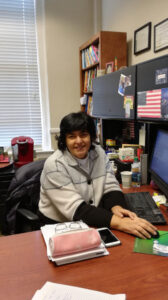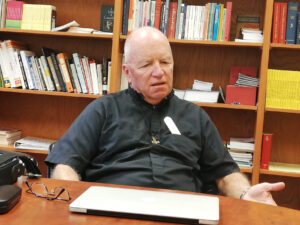
Love attracted the University of Mississippi’s Dr. Julia Bussade to come to the United States for the second time in 1994. It was hard for her to leave behind everything – family, relatives, culture and language. But after 25 years, she thinks it was a good decision.
“I am from Brazil, but now I am an American,” said Bussade. After 25 years, her Brazilian accent has gone and her English is fluent. Bussade first came to this country in 1992 to be an exchange teacher in Jamestown, New York. She was there for six months to learn English. She got the chance to mix with the locals and there she met Richard Jones, a teacher. He was tall, nearly six feet, blue eyes, blond.
“At first it was totally one-sided love story,” Bussade said. She had no plans to settle down in the U.S. and had a good job back in Rio. Her parents and her only brother were waiting for her back home. “I had huge responsibility towards them. So, after finishing my course I went back.”
However, fate intervened. In October 1993, Julia lost her job and could not find another. She called her boyfriend, and he told her to come to the U.S. So, on the first of January, 1994, she boarded the plane from Rio and reached Birmingham, Alabama, on January 2 of that year.
“This is true, the way I flourished my career here, I could not have been able to do that in Brazil. Though it is my home country but the opportunities are less than in the U.S.A.”
Through her marriage, Julia got her residency in 1995. “It was easy to obtain permission to stay. But nowadays, it has become so hard.” She said that many people now coming from other countries are weak in English and have little education. She said she believes these things are holding them back in terms of entering the country legally.
Julia is now working as director of Spanish and Portuguese programs at the University of Mississippi. She is financially independent and, still, a big help for her family back home. She termed herself lucky because the way she got the job and citizenship was with less hassle. “But I know many people who did not get a job easily. Or, maybe, they are living in this country for like 30 years and still not getting their green card.”
Immigration Changes
Immigration is a major issue in America with many opposing viewpoints. For example, as of February 2018, the United States is no longer “a nation of immigrants”. The U.S. Citizenship and Immigration Services (USCIS) changed its mission statement and the agency has deleted the phrase “a nation of immigrants” in the new statement on its website, although the opponents of the present Trump administration have criticized the change.
“The ICE people are no longer going after criminals, they are going after simple and hard-working immigrants,” lamented Father Mike McAndrew of the Catholic Diocese of Jackson. McAndrew has been active in immigration issues since 1991 when he was with a parish in Denver that ran a youth house. It was basically a safe house for Hispanic kids from Mexico and Central American countries. He found people migrating to America for reasons beyond the stereotype economic need, fear, insecurity, lack of resources in their own country. On-going violence is another vital reason.

Since McAndrew started working with immigrants, his vital task has been translating necessary documents into English from Spanish before the lawyers take up the cases. He said ICE has deported people of skill and knowledge who could help farmers in Mississippi, Louisiana, Arkansas, Tennessee and Alabama.
According to McAndrew, the modus operandi of immigration authorities has changed in recent years. The government earlier never used to appeal against court decisions that went in favor of an aspirant. “Now, they have made a policy that they are going to appeal every decision that goes against the government.” The Board of Immigration Appeals, the highest administrative body for interpreting and applying immigration laws, is not a new entity, but under the Trump administration, their appeals decisions have been mostly in favor of the government.
Seeking Citizenship
The University of Mississippi’s Edgar Serrano hopes that new paradigm won’t affect his chances to become a citizen. Serrano was only 19 when he decided to leave Mexico to be more competitive. The youngest of six siblings in a middle-class family in Mexico City, Serrano dreamed of someday coming to America and in 1991 he told his parents about his dream. They told him to first get his visa and the money he would need. He cleaned and painted others’ houses, washed people’s cars, cleaned the local church, and did all kinds of other labor. Working day and night for six months, Serrano saved as much money as required to buy a bus ticket from Mexico City to the border city of Reynosa. After he had obtained a tourist visa, with watery eyes his family, particularly his parents, bade him farewell and wished him luck. Once he had crossed the border, Serrano boarded a Greyhound bus to come to Mississippi to one of his sisters. The journey took him more than four days.

Many people in other parts of the world wish to come and settle down in what is to them a magical country. In Edgar Serrano’s land of dreams, he began a new struggle, the struggle to stay here in search of a better life than back home. His relatives suggested that to stay in the United States for a longer period of time, he should get admitted into a college. Serrano came to the University of Mississippi to seek admission. The authorities told him that he needed to pass the TOEFL (Test of English proficiency as a Foreign Language). He studied for four months to pass the test and got admitted to the Business Administration program. Serrano had to travel back home to get his F1 visa.
During his undergraduate days, Serrano worked hard for survival in the U.S. “I worked in two places for my food and staying.” But he missed his family and friends back home most in those days. He was determined to accomplish his dream to get established in his dreamland America.
His determination paid off. Even before he completed his graduation he got a job offer in a Los Angeles-based furniture factory in 1996. He saw it as an opportunity to settle down in the U.S. He became the company’s international director in charge of Spanish speaking Latin American countries, Eastern Europe, and Spain. He was doing well, living a good life. His company sponsored him with a work permit. “At that time I didn’t bother for citizenship. I had a good job, making a six-figure salary and paid $3000 monthly rent for the house in Los Angeles”. He continued with the ‘blessing job’ for twelve-and-a-half years. But unfortunately, in 2008, the economic recession shattered everything. The company went bankrupt, and he lost his job and soon all his savings were gone. “I had only two options, either to go back to Mexico or come back to Mississippi where I would get support from my sister and brother-in-law.”
He decided to start over again and joined school again. He got admitted to the master’s program in modern language at the University of Mississippi. His Spanish background once again came as a blessing and he found a job teaching Spanish in an elementary school in Oxford.
Edgar Serrano now also works as an instructor for Spanish language at the University of Mississippi. “I had always dreamed to living in a safe and secured environment. And the U.S. is giving me that.”
Recently, Serrano filed his application for U.S. citizenship. After 28 years in America, he has adopted the culture. He loves Mexico City, has lot of memories with his family and friends, but when he thinks about the traffic, pollution and social changes, he finds himself a lucky one among the millions.
The issue of immigration is complex and affects many aspects of Mississippi life – from faculty teaching at the flagship university to farm laborers bringing in the harvest, immigrants have long played a role in the state’s economy and culture. The same can be said for the country as a whole.
The Center for Immigration Studies reports that in 2018 nearly 45.4 million (legal and Illegal) immigrants live in the USA. The total number of legal immigrants in the United States from all over the world at present is around 37 million. Every year since the year 2000, nearly one million new immigrants are added, of whom 600,000 are those who had applied for ‘Change of Status’. Between 2010 and 2017, about 9.5 million people migrated to the United States from places like Mexico, the Middle East, and Asian countries. And the prediction is that the immigrants will be coming more in the future for a better life and vast opportunities in the U.S. and in Mississippi.
Story contributed by University of Mississippi School of Journalism & New Media graduate student Sima Bhowmik.
